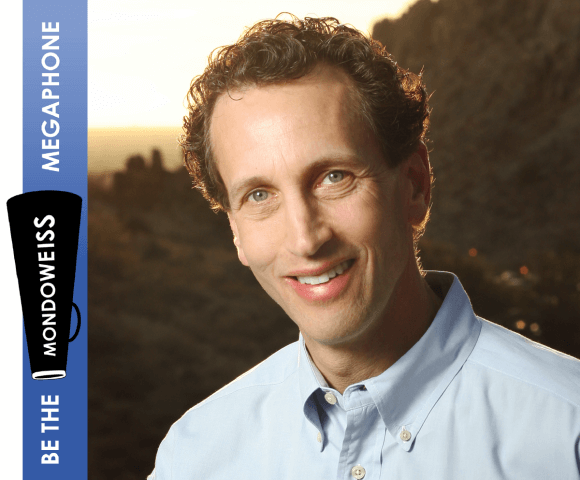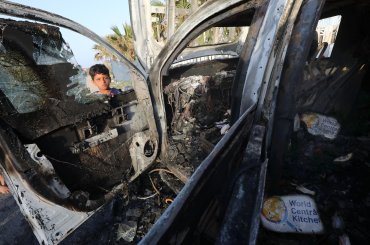Bob Lord is a Phoenix activist, blogger, former Congressional candidate, and associate fellow at the Institute for Policy Studies. We are pleased to present his response to our request for readers’ stories in the current “Be The Mondoweiss Megaphone” fundraising campaign. Please join Bob in sharing your journey with us at submissions@mondoweiss.net; personal stories can have dramatic effects in changing people’s minds.
Bob says,“Speaking out has not been without cost for me. I have been cautioned by friends and scolded by Zionist acquaintances about the potential clients I’ve lost. In this regard, I’m no different than anyone else who is speaking out. Some may not incur a financial cost, but we’ve all lost friendships and, for many, familial relationships. But speak out we must. Thanks for all you do at Mondoweiss.”
If you, like Bob, believe that the voices in Mondoweiss make a difference for justice in Palestine, please contribute today to continue and expand the work you value. As of today, donations received total $33,789 from 290 people. We will continue the campaign until the end of July, because we believe that freedom in Palestine and wise U.S. foreign policy demand of us an increase in effectiveness.
Click here to see how dollars and cents are transformed into truth-telling. Please give whatever you can, and tell others who value good journalism why you choose to support this work.
As awful as things get in Israel/Palestine, I cling to hope. The reason? If my views could change as dramatically as they have, the views of others can as well. And maybe, just maybe, we’re starting to see that happen.
I traveled to Israel in 1995. I was on the plane from Phoenix to New York the moment Yitzhak Rabin was shot. Too late to turn back, I spent six days in Israel with other guests of a pro-Israel charity. Israel was in mourning, as this country was after JFK’s assassination. Yet the people we met welcomed us. And we of course saw only the best Israel had to offer. No West Bank. No Gaza.
I boarded the El Al flight back to New York very much the Zionist. Then, on the trip to Phoenix from New York, I shared a row with West Bank settlers on their way to Los Angeles. They didn’t do much to conceal their radical views, their hatred of Palestinians, and, yes, their near-elation over Rabin’s death.
Nothing changed in me immediately, but perhaps seeds of doubt had been sown.
Fast forward twelve years or so.
I became a Congressional candidate in 2007. Early in the campaign, I spoke to a Jewish group about my campaign, with no mention of Israel, at least not intentionally. But I did reference Jimmy Carter’s energy policy in a positive way. Based on the reaction of the group, it was clear I lost half of them because I did not despise every aspect of Jimmy Carter’s being, as they did. I don’t recall whether Carter had published Palestine: Peace, Not Apartheid by then. He probably had.
After the meeting, several members of the group decided they should “educate me” on Israel, even though my views were very much pro-Israel. I listened, but my sense was that they’d been exposed to a couple of instances of Palestinian violence and had concluded that all Palestinians were inherently violent. The scientist in me (I was a biochemistry major) told me their sample size was too small.
Perhaps more seeds of doubt, but nothing more. My views on Israel were not going to change because I met a couple haters who happened to be Jewish.
Then, a turning point: The 2008 annual AIPAC breakfast in Phoenix.
My opponent, John Shadegg, was pro-Israel, a raging Islamophobe, and a favorite of local AIPAC members. Nonetheless, I knew several AIPAC board members and was welcomed to the breakfast.
Two things happened. First, Shadegg gave a very short speech, under a minute, dedicated entirely to recommending two books to the crowd: Knowing the Enemy and America Alone. More on those later. Second, the tone in the room was chilling. The substance of the remarks of various speakers, mostly about Iran, was not that surprising. But the bellicosity of the room was like nothing I’d ever felt before in a crowd that large. If they were all of fighting age, 98% of those in attendance would have been ready to march off to war against Iran.
Since Shadegg was urging folks to read Knowing the Enemy and America Alone, I felt I had to as well. Both were anti-Muslim diatribes. In America Alone, the author actually tried to explain away Serbian atrocities in Bosnia on the basis that the Muslims were breeding too fast.
At this point, I was stubbornly hanging on to my pro-Israel views, but not as tightly as I once did.
Then, a breakfast with a potential donor—a Republican no less—who whacked me with information about the situation on the ground and the history of the conflict that I’d never considered before.
Then, a meeting with members of the local Muslim-American community, including a Palestinian. Conclusion: They’re just people. And smart. And likeable. Nothing like the sub-humans I was told they are. One point they made has stuck with me: American Muslims live in constant fear that, if there is another 9/11 type event in the U.S., it will be open season on Muslims, and law enforcement will not protect them.
By mid-2008, my eyes had opened a good bit. I stopped courting the AIPAC crowd and instead sought J Street’s endorsement. J Street has moved to the right recently, but back then it was in its infancy and was emerging as the conscience of the American Jewish community. As an organization, it was openly critical of Jewish settlements on the West Bank and a proponent of the two-state solution.
J Street is in my rear-view mirror now. After remarkable early success, the leaders of the organization became fearful of the Jewish American right-wing and, as a result, increasingly cautious in their statements.
But the journey continues. The more I learn and the more I study, the more I become convinced that the occupation of Palestine is no different from any other occupation in history. The occupier always occupies ground in the literal sense, but never occupies it in the figurative sense, as in “moral high ground.” That ground ultimately goes to the occupied. Without exception.
And if I can make this journey, anyone can. Or so I hope.




that’s really funny, the way some people ..their first reactions. reading the rest now….just had to mention..
that was a great read. i like the way Lord thinks. and this made me laugh again:
Bob Lord typifies what i mean by – go for the masses rather than trying to change people who are already thoroughly indoctrinated in support for israel (although he was an israel supporter). it’s not complicated. supporting free palestine is logical common sense.
;) yep.
Fantastic narrative, thank you Robert. And powerful evidence that if you can make this progression, to seeing Palestinians and Muslims as ordinary folks, just like the kinds of people Americans may be more familiar with, then others are also capable of walking that road… Thanks!
Another case of someone who underwent a conversion from finding out the facts. Perhaps the Archive could have a special section for these conversion stories. They are powerful individually, and would be even more powerful as a group – easy after dinner reading for budding young Zionists.
I’d be deliriously happy if U.S. elected officials would eschew AIPAC, not because I want them to declare solidarity with Palestinians (not that they should not do so) but because I want U.S. elected officials to be loyal, first, last and always, to the United States Constitution, as they pledge to do in their oaths of office, and to the collective (as opposed to “special”) interests of their fellow citizens.
I do want the U.S., particularly as it is apparently too big to not impact the rest of the world, to promote human rights and well being where and when possible – both inside and outside our borders. But our experience in “exporting our values” should keep us humble.
We may well have to work with countries whose political systems we do not like, and whose behavior we don’t like. But that does not mean we should condone such behavior. Particularly when we do our ostensible “allies” (guess who?) no favor by allowing them to contribute to their own eventual self-destruction.